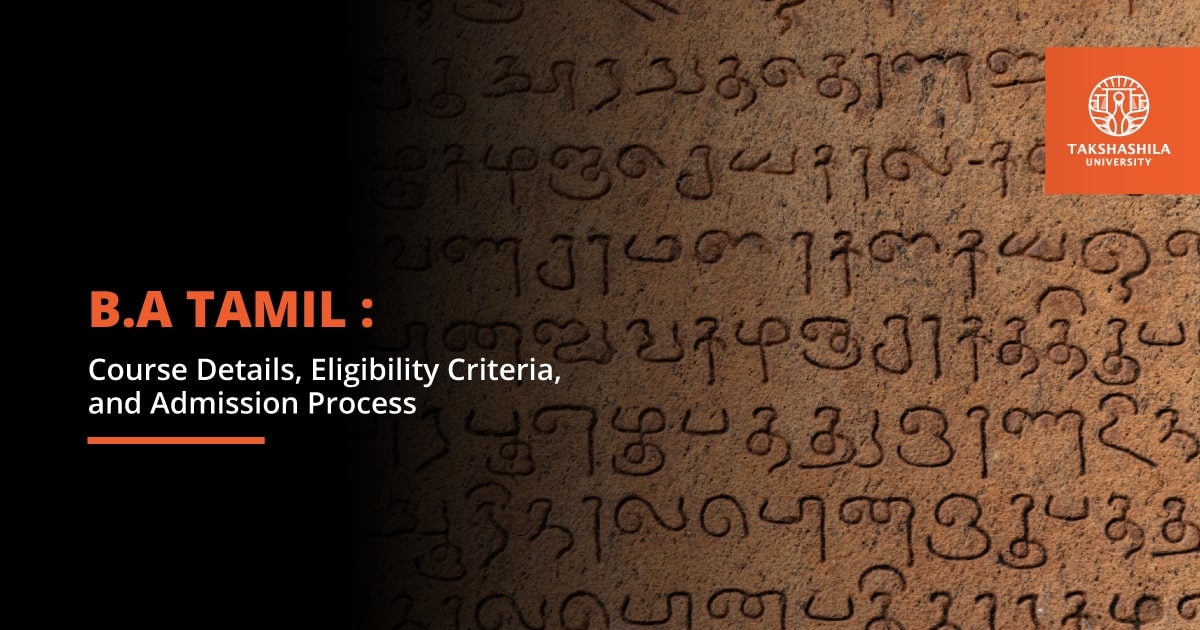Introduction to B.A Tamil
Takshashila University BA Tamil — Tamil is one of the oldest and richest languages in the world. Its well-built history extends over 2000 years. If you have a sincere and deep admiration for the Tamil language, its literature, its people, and its culture, then pursuing a B.A. Tamil might be the best option for you.
A B.A. Tamil is one of the three-year undergraduate programs with a professional emphasis on language in Tamil, its classical and modern literature, and its cultural importance. The course’s curriculum emphasises the development of an understanding of dramatics, linguistics, poetry, and the history of Tamil literature to ensure students are well-prepared for various professional engagements in education, translation, content writing, and others.
This code can also help you appreciate the several aspects of Tamil culture that are considered the cornerstones of preserving the language and its literature.
Let’s look at all the details, such as B.A Tamil: Course Details, Eligibility Criteria, and Admission Process will be explained in this article.

Overview of the B.A Tamil Course
The B.A. in Tamil – language, literature, and culture is invariably unique, with a throw of everything attractive that the student’s mind can imagine. Starting with the 1st year of the program, the students get acquainted with the Akilam and Eetrus model of the language, followed by other classics of Tamil literature along with a brief introduction to how Tamil developed historically over the ages. During the second year, students study works from contemporary literature about the writers’ names and modern times.
During the last year, students can pursue individual studies in subjects like Tamil Folklore, Tamil Linguistics, Comparative Literature or Translation. The course also has its practical part: writing, literary and other types of research, enabling students to combine theoretical knowledge and practical skills related to the Tamil tongue.
Critical Concepts in Tamil Literature
- Classical Tamil Literature: This includes poems that are early forms of Tamil Language literature, notably the Sangam literature, which students regard as the oldest and most admired collection of Tamil Literature. The students study works such as Tolkāppiyam, Purananuru, and Pathitrupaththu.
- Modern Tamil Literature: This subcategory concerns contemporary Tamil writers, poets, and novelists. It includes authors who dynamised the Tamil scene from the 19th century to the present, including Bharathiyar, Kalki Krishnamurthy, and Jeyakanthan.
- Tamil Linguistics mainly deals with studying the Tamil language and describing its structure, development, phonetics, syntax, and semantics. Linguistics assists in understanding the history of the language, including its forms and grammatical structures.
- Tamil Poetry and Drama: Students examine Tamil poetry, drama, and scripts, examining their themes, motifs, literary devices, and cultural value.
- Tamil Folklore and Traditions: Tamil folklore, which includes myths, music, and oral narratives, is a significant part of Tamil culture. Students explore it with the aim of enhancing their cultural and social knowledge of the Tamil population.
- Translation Studies: The second most crucial subject in the hospitable environment is the profession of translating Tamil languages into other languages and vice versa. Translation studies enable students to undertake the translation task without altering the source material’s core idea and cultural context.
Career Opportunities in Tamil
The graduates, without a doubt, possess broader career opportunities in areas of their language interest after studying Tamil language and culture at the bachelor’s level. Some of them include:
- Teacher/Professor: The most popular career for Tamil graduates with a B.A. degree will definitely include teaching Tamil in high school, colleges, or universities. If you further studies, you may also specialise in Tamil literature or linguistics and become a Tamil professor.
- Writer/Poet: If you possess creativity, writing Tamil poetry, books, or articles will provide job satisfaction as it is fulfilling. Many Tamil authors also actively contribute to periodicals, journals, and websites.
- Translator: There is a growing need for translators who can work on Tamil literature and technical documents. Translating works from Tamil to other languages and vice versa is important to promote the language and, most importantly, to sustain its existence.
- Content Writer: Tamil content writers write for websites, blogs, and social media networks in Tamil. They can be employed in digital marketing firms or media houses or self-employed. Writers of Tamil content are also known as ‘Tamils’.
- Linguist: Studying Tamil linguistics and using the expertise for linguistic research, language analytics, or creating educational resources about language is possible.
- Journalist: Tamil graduates can be employed as journalists, practising news reporting, article writing and interviews on Tamil for dailies, television channels, and electronic media.
- Cultural Researcher: Graduates can be employed in research on Tamil folklore, history, and literary pieces that can be published in learnt journals, Accredited research centres, or institutions aiming to preserve culture.
- Public Relations (PR): Graduates with good command of Tamil can pursue careers in PR, assisting in media relations and creating content for companies that target the Tamil-speaking population.
- Subtitling and Dubbing: Tamil film and TV experts are needed to subtitle films, documentaries, and televised Tamil programs.
Eligibility Criteria for B.A Tamil
There are a few eligibility criteria that you need to fulfil before you apply for a B.A. Tamil, and these are as follows:
- Educational Qualifications: You must have completed your higher secondary education (12th grade) from a recognised board. Students who have studied Tamil as one of their subjects in school are usually preferred, but it is not always mandatory.
- Minimum Marks: The minimum marks required vary from institution to institution. However, most colleges do not admit students with less than 50% to 60% marks in 12th Grade Exams.
- Age Limit: B. A Tamil may be pursued by anyone, regardless of age. Any age group can apply, provided the educational criteria are met.
Skills Required for B.A Tamil Students
To do well in a B.A. Tamil programme, students should develop the following skills and attributes:
- Fluency in Tamil: Since the course revolves mainly around the Tamil Language, it is natural that success can only be achieved with mastery of Tamil in its written and spoken forms.
- Critical Thinking: Dissecting Tamil literature, comprehension of various opinions, and completing evaluations of literature all require critical thinking.
- Good Writing Skills: Writing essays, research papers, and translation requires a lot of writing, and students need to be good at it, as it is required throughout the sessions in this course. Clear, simple, and imaginative writing is essential for success in the course.
- Analytical Skills: The ability to study texts, identify the main ideas and references, and comprehend the sociocultural settings is essential in studying Tamil literature.
- Cultural Understanding: Students must appreciate the cultural, temporal, and social circumstances in which Tami literary texts were produced.
- Research Competence: Research forms an essential area of emphasis in studying Tamil literature due to historical texts, literature critique, and translation studies.
Why Choose Takshashila Engineering College for B.A Tamil?
You should consider Takshashila Engineering College for your B for many reasons—a Tamil.
- Qualified Staff: The college has a team of well-trained and enthusiastic tutors who specialise in Tamil literature, language, and culture. They take students through the intricacies of the Tamil language and literature.
- Broad Curriculum: The B.A. Tamil Course at Takshashila College has been purposefully structured to enable its students to develop basic knowledge and skills in both the students’ historical and contemporary literature and linguistics. The syllabus was constantly revised to incorporate modern Tamil novels and trends in the literary scene.
- With Emphasis on Cultural Appreciation: Takshashila aims to advance an intensive understanding of Tamil culture, practices and history. Students are urged to focus on Tamil myths, arts and the thrust of socio-cultural matters.
- Practical Exposure: Numerous avenues are provided for college students to get practical experience, including internships with media houses, cultural organisations, and publishing companies. Students also get an opportunity to participate in workshops, literary fests, and seminars.
- Personalized Attention: Takshashila students are facilitated by the time and guidance of their professors, and therefore, smaller classes help them better deal with complex texts and ideas.
- Extracurricular Activities: The college administration also encourages students to engage in activities outside the curriculum, such as tamale writing competitions, book clubs, and cultural shows, which enrich their academic and creative pursuits.
Admission Process for B.A Tamil
The admission process of B. A Tamil is quite simple and involves the following:
- Application Form: Students can access an online or offline application form on the college’s website. The form has to be completed with basic information regarding the student’s details, history of education and contact information.
- Merit-based Admission: Most colleges grant admission in B.A Tamil on the basis of merit-cum marks from the 12th grade examination. However, some colleges may require an entrance exam or interview, especially for more competitive programs.
- Counselling/Interview: Where applicable, an interview or counselling session may be organised to evaluate your willingness to study the Tamil language and literature and your educational aspirations.
- Document Verification: After receiving the offer letter, students receive an invitation to submit original documents for verification, and photocopies of certificates, identity cards, and passport photographs are needed most.
- Payment of Fees: At this stage, students submit the necessary admission fees to secure their seat in the program after completing the verification.
Curriculum and Course Structure
Generally, the B. A Tamil program is organised into three years of courses subdivided into different components, themes or content areas of Tamil literature and language during each year of study as follows:
- First year: Students are introduced to the Tamil language, with a focus on its origins, classical literature, Tamil literature with a history focus, and an introduction to language structure. A component of the course includes an introduction to the history and development of Tamil as a language.
- Second year: Investigate contemporary and classical Tamil literature relevant to various prominent authors, poets, and dramatists, as well as study advanced Tamil linguistics in simulation practice.
- Third year: Some of the Themes include Tamil folklore, translation, literary studies, and modern Tamil literature. Students have to complete a dissertation based on Tamil literature and culture related to their project work.
Top Institutions for B.A Tamil
Some of the best institutions offering B.A Tamil in India include:
- Takshashila College
- University of Madras, Chennai
- Alagappa University, Karaikudi
- Bharathidasan University, Tiruchirappalli
- Sri Sankara College, Kanchipuram
- Government Arts College, Coimbatore
- Loyola College, Chennai
Conclusion
In Takshashila Engineering College, the B. A Tamil program is an excellent chance to explore the spiritual and historical background of the Tamil language and transcripts. This program is well planned to give a student a broad perspective of Tamil literature, language, and culture, making the course comprehensive in the best sense of terms with an ancient language that is very much alive today.
The rich curriculum is based on classical literature. It offers cutting-edge courses, preparing students for professions such as academics, journalism, translation, educational programs and activities, and cultural education. It also creates awareness of the history and culture of Tamil and develops critical and analytical thinking dispositions.
Whether students want to acquire higher education, pursue research, or start a professional career in the subject, the B. A in Tamil at Takshashila Engineering College offers the support and encouragement needed to be successful in this fascinating and vital field.
If you have any further queries regarding the fee structure, contact Takshashila mentors today !
FAQs
1.How long is the B.A. Tamil course?
Generally, the course extends to about three years.
2.Can I take B.A. Tamil if I have not studied Tamil in high school?
Some individuals may already know Tamil; however, it is optional to apply. However, the knowledge of Tamil would be crucial to carrying out the programme successfully.
3.What are the job prospects after B?A Tamil?
Various options are available, such as writer, teacher, translator, journalist, technical writer, and cultural researcher. Areas of employment include media, publishing, and PR.
4.Can I go for higher studies after earning a B?A Tamil?
You can pursue an M.A. in Tamil, an M.Phil, or a doctorate in Tamil literature linguistics or translation in formal education.
5.Is B.A Tamil course offered in Indian universities through entrance exams?
Generally, all university admissions are made on a merit basis, determined by performance in 12th-standard examinations. However, a few colleges may also require students to qualify for an entrance test or interview.






